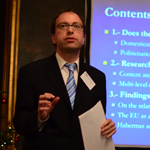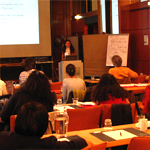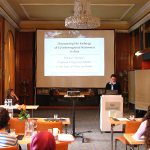Euroacademia Conferences
 Europe Inside-Out: Europe and Europeanness Exposed to Plural Observers (9th Edition) April 24 - 25, 2020
Europe Inside-Out: Europe and Europeanness Exposed to Plural Observers (9th Edition) April 24 - 25, 2020 Identities and Identifications: Politicized Uses of Collective Identities (9th Edition) June 12 - 13, 2020
Identities and Identifications: Politicized Uses of Collective Identities (9th Edition) June 12 - 13, 2020 8th Forum of Critical Studies: Asking Big Questions Again January 24 - 25, 2020
8th Forum of Critical Studies: Asking Big Questions Again January 24 - 25, 2020 Re-Inventing Eastern Europe (7th Edition) December 13 - 14, 2019
Re-Inventing Eastern Europe (7th Edition) December 13 - 14, 2019 The European Union and the Politicization of Europe (8th Edition) October 25 - 26, 2019
The European Union and the Politicization of Europe (8th Edition) October 25 - 26, 2019 Identities and Identifications: Politicized Uses of Collective Identities (8th Edition) June 28 - 29, 2019
Identities and Identifications: Politicized Uses of Collective Identities (8th Edition) June 28 - 29, 2019 The European Union and the Politicization of Europe (7th Edition) January 25 - 26, 2019
The European Union and the Politicization of Europe (7th Edition) January 25 - 26, 2019 7th Forum of Critical Studies: Asking Big Questions Again November 23 - 24, 2018
7th Forum of Critical Studies: Asking Big Questions Again November 23 - 24, 2018 Europe Inside-Out: Europe and Europeanness Exposed to Plural Observers (8th Edition) September 28 - 30, 2018
Europe Inside-Out: Europe and Europeanness Exposed to Plural Observers (8th Edition) September 28 - 30, 2018 Identities and Identifications: Politicized Uses of Collective Identities (7th Edition) June 14 - 15, 2018
Identities and Identifications: Politicized Uses of Collective Identities (7th Edition) June 14 - 15, 2018
Papers
European Civil Society: Theoretical Considerations and Empirical Evidence
This paper aims to critically examine the question of whether there is anything particularly ‘European’ or ‘civil’ in European civil society, ECS herein. For the purpose of explaining the ‘European’ attribute, I develop a conception of a civil society that portrays it as a product of the dialectics between the European single market and the new experimental governance structure.European Integration and Politicization of Europe Trough Ideational Entrepreneurs
As demonstrated, for instance, during the campaign of the first EU constitutional referendum, external influences on national as on European institutions can be proved as effective and able to shape the EU. The paper aims to examine the production and circulation of ideas across networks of non-state organizations (Think Tanks, NGOs, Foundations) spanning the European Area and willing to influence EU institutions.European Parliamentary Elections: Candidates as Possible Politicisers?
Elections to the European Parliament (EP) fall within the category of second-order elections. Because these types of elections do not lead to the formation of government there is less at stake and, consequently, voters behave differently when casting vote. Given their aggregate nature, the predictions of the second-order elections theory have mostly been tested using aggregate electoral data and election-related survey data.Distant and Apolitical? A Comparative Study of the Domesticisation and Politicisation of the EU in Yorkshire (UK) and Galicia (Spain)
This paper draws on Carl Schmitt’s conceptions of democracy and ‘the political’ to explain the seemingly apolitical and distant character of the European Union. Schmitt conceived democracy as a regime of identity between the government and the governed, and ‘the political’ as ‘friend versus enemy’ relationship.Differentiated Integration as a Trend of EU Future Development
The papers starts form analyzing the historical trends of differentiation in the EU, in particular 1) from case by case approach toward predefined mechanisms like enhanced cooperation and permanent structural cooperation;The Legitimacy of Public Information Campaigns about EU Referenda
This paper investigates the challenges that national governments face in their public referendum campaigns about European integration. Over the last 50 years, more than 40 referendums have been organized about the EU (or EC), mainly dealing with treaty ratification, accession or specific issues such as the adoption of the Euro.Monetary Union and the Politicization of Europe
This paper argues that the politicization of Europe is largely due to the decision to proceed with economic and monetary union (EMU) and to the subsequent crisis of the euro zone—a crisis that had been predicted by some of the world’s best experts: economists such as the Nobel Prize winner Milton Friedman, Harvard’s Martin Feldstein and Kenneth Rogoff, Berry Eichengreen of the University of California at Berkeley, and by several other top specialists (Majone 2009; 92-94). That their warnings were totally disregarded by both EU leaders and European institutions is something that has to be careExternal Democratization Efforts Of European Organizations In Armenia: Unintended Side Effects?
The paper investigates the achievements and challenges of European organizations as external factors in promoting democracy-oriented reforms and democratic institution building in Post-Soviet Armenia.The European Union Legitimacy
The European Union is an organisation considered by all as a sui-generis, or supranational one. From its establishment till now it faced different challenges. One of them is the legitimacy issue which started to be a strong challenger immediately after the Maastricht treaty.Discovering The Icebergs Of The EU Inter-regional Actorness in Asia: The EU As An Unique Regional Integration Model In The Eyes Of China And India
The European Union is likely to differentiate itself from other international actors. It claims to be ‘unique’ and characterized by several distinctive features such as for example the EU’s model for regional integration.











